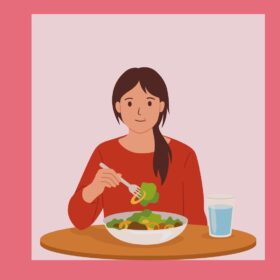Urinary incontinence, or the loss of control over urination, is a common condition that affects millions of people worldwide. The food and beverages you consume can play a crucial role in bladder health, either improving symptoms of incontinence or aggravating them.
How To Manage Your Diet to Support Bladder Health
To help manage your bladder health you should try to avoid irritants and incorporate supportive nutrients. It’s not about drastic changes but making consistent, intentional choices.
Identify and Eliminate Bladder Irritants
Many common foods and beverages can irritate the bladder lining, making symptoms like urgency, frequency, and leakage worse. Known culprits include:
- Caffeine (found in coffee, tea, and chocolate)
- Alcohol
- Carbonated drinks (sodas, sparkling water)
- Acidic foods (tomatoes, citrus fruits)
- Spicy foods
- Artificial sweeteners
This can of course vary from person to person with some people finding that they are unaffected by common sources of irritation. Experiment and find out what works for you.
Eat Regular, Balanced Meals
Skipping meals or eating large portions at once can disrupt digestion and bladder function. Small, well-balanced meals support better nutrient absorption and reduce pressure on the bladder.
Stay Hydrated (But Not Overhydrated)
It may seem logical to cut back on fluids to reduce incontinence episodes, but dehydration can actually worsen symptoms by irritating the bladder. Try to drink moderate amounts (6–8 cups daily unless otherwise advised by a Healthcare Professional) and avoid large intakes before bed.
What Foods Help With Bladder Health?
Certain foods have been shown to reduce inflammation and promote overall urinary tract health. These bladder-friendly foods include:
High-Fibre Foods
Constipation can put pressure on the bladder and worsen incontinence. A diet rich in fibre helps maintain regular bowel movements. Great sources include:
- Whole grains (brown rice, oats, whole wheat)
- Legumes (lentils, black beans)
- Fruits like pears, apples (with skin), and berries
- Vegetables like broccoli, carrots, and leafy greens
Low-Acid Fruits
Unlike citrus fruits, which may irritate the bladder, low-acid options are more soothing:
- Bananas
- Melons (watermelon, cantaloupe)
- Apples (sweet varieties)
- Blueberries and pears
Vegetables with High Water Content
These help with hydration and deliver essential nutrients:
- Cucumbers
- Celery
- Courgette
- Peppers
Lean Proteins
Protein is crucial for tissue repair, including the bladder. Opt for:
- Skinless poultry
- Eggs
- Tofu
- Fish (especially those rich in omega-3 fatty acids like salmon)
Magnesium-Rich Foods
Magnesium helps support proper nerve function and muscle relaxation, including in the bladder. Sources include:
- Pumpkin seeds
- Almonds
- Spinach
- Black beans
What Drinks or Teas Are Good for Bladder Health?
Many common beverages can irritate the bladder, but some drinks can have a soothing or even therapeutic effect.
Water – The Gold Standard
Pure water is essential for flushing bacteria from the urinary tract and maintaining hydration. Sipping water consistently throughout the day is more beneficial than drinking large amounts at once. Sipping allows your body to absorb water more effectively and slowly, leading to better hydration.
Herbal Teas
Some herbal teas may benefit bladder health like Chamomile Tea which is known for it calming effects and may also reduce inflammation. Always consult your doctor before adding herbal supplements or teas to your routine, especially if you're on medication.
How to Maintain Good Bladder Health?
Maintaining bladder health goes beyond food and drink—it also involves lifestyle practices that support the urinary system and overall well-being.
Practice Pelvic Floor Exercises (Kegels)
These exercises strengthen the muscles that control urination and can significantly improve bladder control over time. Find out how to practice pelvic floor exercises with our free downloadable guides.
Avoid Smoking
Smoking increases the risk of bladder cancer. It can also lead to chronic coughing, which puts additional pressure on the bladder.
Timed Voiding and Bladder Training
Instead of rushing to the bathroom every time you feel the urge, try bladder training techniques. These help increase the time between urinations, improving bladder capacity and control.
Stay Consistent with Hydration
Avoiding fluids can lead to concentrated urine, which is more likely to irritate the bladder. Consistency is key—drink moderate amounts throughout the day and reduce intake in the evening to prevent night-time accidents. Always follow your Healthcare Professionals advice if you have been advised otherwise.
You can find out more about how to manage your diet to support bladder health with our Nutrition Guide for Continence Patients. It’s free to download and can help you to make simple changes to help ease your symptoms.
